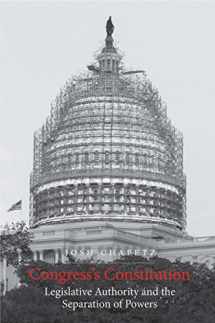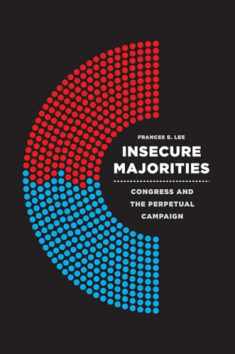
Congress's Constitution: Legislative Authority and the Separation of Powers
ISBN-13:
9780300248333
ISBN-10:
0300248334
Edition:
Reprint
Author:
Josh Chafetz
Publication date:
2019
Publisher:
Yale University Press
Format:
Paperback
448 pages
Category:
United States History
,
General
,
Constitutional Law
,
Americas History
FREE US shipping
Book details
ISBN-13:
9780300248333
ISBN-10:
0300248334
Edition:
Reprint
Author:
Josh Chafetz
Publication date:
2019
Publisher:
Yale University Press
Format:
Paperback
448 pages
Category:
United States History
,
General
,
Constitutional Law
,
Americas History
Summary
Congress's Constitution: Legislative Authority and the Separation of Powers (ISBN-13: 9780300248333 and ISBN-10: 0300248334), written by authors
Josh Chafetz, was published by Yale University Press in 2019.
With an overall rating of 3.8 stars, it's a notable title among other
United States History
(General, Constitutional Law, Americas History) books. You can easily purchase or rent Congress's Constitution: Legislative Authority and the Separation of Powers (Paperback) from BooksRun,
along with many other new and used
United States History
books
and textbooks.
And, if you're looking to sell your copy, our current buyback offer is $2.21.
Description
A leading scholar of Congress and the Constitution analyzes Congress’s surprisingly potent set of tools in the system of checks and balances.
Congress is widely supposed to be the least effective branch of the federal government. But as Josh Chafetz shows in this boldly original analysis, Congress in fact has numerous powerful tools at its disposal in its conflicts with the other branches. These tools include the power of the purse, the contempt power, freedom of speech and debate, and more. Drawing extensively on the historical development of Anglo-American legislatures from the seventeenth century to the present, Chafetz concludes that these tools are all means by which Congress and its members battle for public support. When Congress uses them to engage successfully with the public, it increases its power vis-à-vis the other branches; when it does not, it loses power. This groundbreaking take on the separation of powers will be of interest to both legal scholars and political scientists.
Congress is widely supposed to be the least effective branch of the federal government. But as Josh Chafetz shows in this boldly original analysis, Congress in fact has numerous powerful tools at its disposal in its conflicts with the other branches. These tools include the power of the purse, the contempt power, freedom of speech and debate, and more. Drawing extensively on the historical development of Anglo-American legislatures from the seventeenth century to the present, Chafetz concludes that these tools are all means by which Congress and its members battle for public support. When Congress uses them to engage successfully with the public, it increases its power vis-à-vis the other branches; when it does not, it loses power. This groundbreaking take on the separation of powers will be of interest to both legal scholars and political scientists.


We would LOVE it if you could help us and other readers by reviewing the book
Book review

Congratulations! We have received your book review.
{user}
{createdAt}
by {truncated_author}



